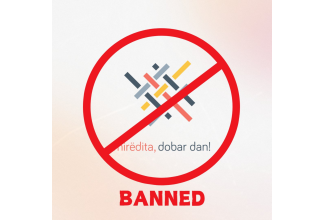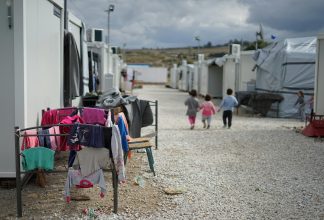Open letter: The situation of lead-poisoned Roma communities in Mitrovica, Kosovo, must be resolved
Dear Secretary-General Guterres, Special Representative to the Secretary-General Ziadeh, and Member States of the United Nations:
We, the undersigned organizations working for the advancement of Roma rights, are writing to urge you to work together to finally resolve the situation of lead-poisoned Roma (1) communities in Mitrovica, Kosovo, by providing long overdue reparations to the victims.
As you are aware, Roma residents of displacement camps suffered from over a decade of continued lead exposure while the UN served as interim administration in Kosovo, as documented by the activist Paul Polansky, Chachipe, Society for Threatened People, and many others. The situation, which the Council of Europe Commissioner for Human Rights called the “most serious humanitarian and environmental problem in Europe”, resulted in several deaths, and persistent illnesses and disabilities among camp residents. Affected community members continue to struggle with health complications associated with lead exposure.
It has now been eight years since the UN-established Human Rights Advisory Panel (HRAP) found the UN Mission in Kosovo (UNMIK) responsible for human rights violations related to the lead poisoning in a case brought by human rights lawyer Dianne Post. HRAP called on UNMIK to pay adequate compensation for both the material and moral damage of Roma community members who resided in the camps and make a public apology to victims and their families, among other recommendations. Yet, the UN-established trust fund for Roma communities remains largely unfunded and does not redress the harm suffered by the victims. Victims have still not received compensation for their injuries or access to medical care to address the ongoing effects of lead poisoning.
The UN’s inaction has been rightly met with global outcry that is only growing. Then UN Special Rapporteur on Human Rights and Toxics, Mr. Baskut Tuncak, called the Trust Fund an “inoperative and fundamentally flawed” mechanism which provides “neither justice nor the necessary elements of an effective remedy for the victims” and demanded that the UN engage in a community consultation to determine an effective remedy. Recently, the Special Rapporteur on Truth, Justice and Reparation called on “the United Nations [to] acknowledge responsibility for the harm done and provide full and effective reparation… including by adopting a fully funded reparation programme” . The Special Rapporteur also urged States to fund the trust fund in his report on financing reparations presented to the General Assembly. The UN’s continued failure to provide an effective remedy has also been criticized by the European Parliament and various human rights and Roma organizations, such as Human Rights Watch, the European Roma Rights Centre, Society for Threatened Peoples, Chachipe, Kosovo Roma Rights Coalition, Roma Center e.V./ Roma Antidiscrimination Network and Harvard Law School’s International Human Rights Clinic.
We welcome the initiative by Switzerland and the United Kingdom to highlight this issue at a recent UN side event, and call on other Member States to champion a just resolution of this issue. The UN’s refusal to accept accountability in Kosovo hurts both the victims and Roma communities across Europe. As organizations committed to building up Roma communities and creating a future based on justice and fairness, we urge the UN to provide justice for the affected community in Mitrovica. The UN must transform the HRAP decision into concrete results by providing adequate reparation to affected community members. Closing this painful chapter in history will be a monumental step in ensuring that Roma communities throughout Kosovo can flourish.
Sincerely,
Amaro Drom e.V.
Bundes Roma Verband e.V. (Federal Roma Association)
Chachipe
Civil Rights Defenders
Dianne Post, Legal Representative for victims
European Roma Rights Centre
Humanitarian Law Center Kosovo
Kosovo Roma Rights Coalition (KRRC)
Roma Center e.V./ Roma Antidiscrimination Network
Roma for Democracy, Kosovo
Society for Threatened Peoples
The Central Council of German Sinti and Roma /Der Zentralrat Deutscher Sinti und Roma
Verein Rom e.V., Köln
Voice of Roma, Ashkali and Egyptians
Youth Initiative for Human Rights Kosovo
(1) ‘Roma’ is used here as an umbrella term to encompass Roma, Ashkali and Egyptian people in Kosovo. This conforms with approaches adopted by the United Nations and other international and European institutions, including the European Union and Council of Europe, to unify and strengthen equality for Roma communities. See e.g., United Nations, The Role of the United Nations in Advancing Roma Inclusion, February 2013. https://europe.ohchr.org/Documents/Publications/RomaInclusion.pdf (“the term “Roma” is used to refer to a number of different groups (Roma, Sinti, Gypsies, Kale, Romanichels, Beash, Ashkalis, Egyptians, Yenish, Travellers, Dom, Lom, and others) identified as at risk of discrimination or social exclusion. UN approaches in this area are broadly harmonized with those of other International institutions, including the Council of Europe, the European Union, the OSCE, and others”); The European Commission, “Roma equality, inclusion and participation in the EU”, https://ec.europa.eu/info/policies/justice-and-fundamental-rights/combatting-discrimination/roma-eu/roma-equality-inclusion-and-participation-eu_en#:~:text=The%20umbrella%2Dterm%20’Roma’,discussions%20commonly%20employ%20this%20terminology (“The umbrella-term ‘Roma’ encompasses diverse groups, including Roma… Ashkali, Egyptians…); Council of Europe Descriptive Glossary of Terms Relating to Roma Issues, May 18, 2012, http://a.cs.coe.int/team20/cahrom/documents/Glossary%20Roma%20EN%20version%2018%20May%202012.pdf (explaining that the term “Roma” was adopted for use after extensive consideration of history and consultation with various sub-groups, and reflects a consensus view across the Council). We recognize that there are differing perspectives on the most inclusive way to refer to Roma, Ashkali and Egyptian people in Kosovo, who share complex commonalities and differences. By opting to conform with international approaches, we are not intending to exclude those who self-identify as Ashkali and Egyptian.


